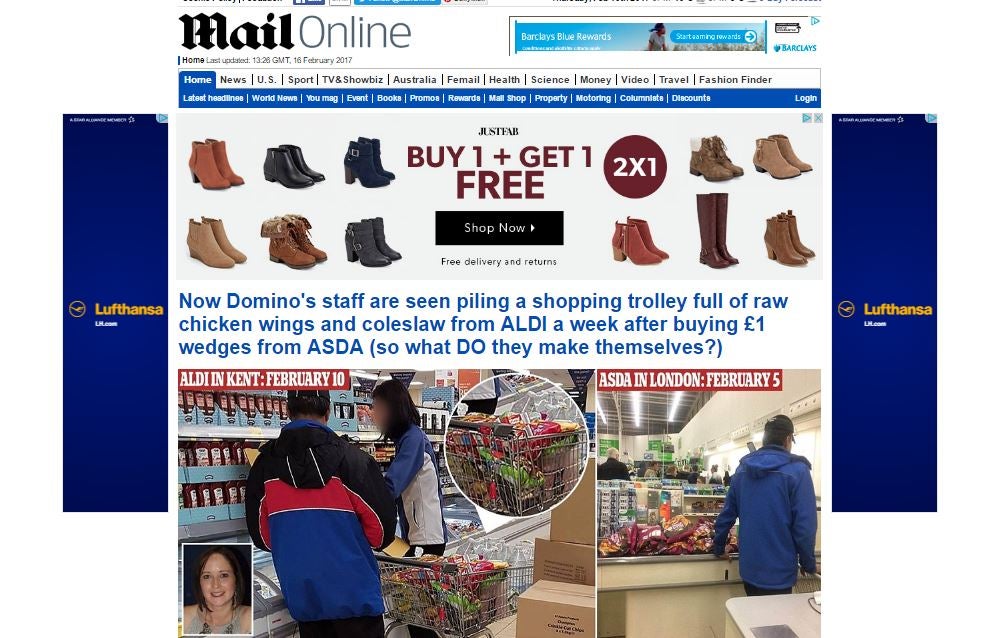
Mail Online hit a new website traffic record in January with 15.6m daily browsers and 243m over the course of the month, according to ABC.
This compares to the site’s previous record of 15.2m daily browsers in August 2016.
The site averaged just over 200m daily page impressions a day in a month where the news was dominated by the inauguration of US president Donald Trump.
In terms of unique browsers, around three quarters come from outside the UK, with 66m inside the UK. Each browser counted by ABC is a different device (rather a different person).
The Guardian website is believed to be in second place (in terms of UK newspaper websites), although it is not currently audited by ABC.
Its internal data claims 8.9m average daily browsers (up 18.7 per cent).
The Sun was the fastest growing website, up 122 per cent year on year to 4.2m unique browers per day.
All other UK national newspaper websites grew year on year, with the exception of the Telegraph which fell 12.3 per cent as it felt the effect of creating an online paywall for premium editorial content.
UK newspaper website traffic for January 2017 (source ABC)
| Title | Daily average browsers | m/m % change | y/y % change |
| MailOnline | 15,641,619 | 11.8 | 5.98 |
| Mirror Group Nationals | 5,453,722 | 9.96 | 13.09 |
| The Independent | 4,830,779 | 34.46 | 45.01 |
| The Sun | 4,247,921 | 20.16 | 122.41 |
| Telegraph | 4,044,489 | 15.31 | -12.3 |
| express.co.uk | 1,637,521 | 16.05 | 16.99 |
| Metro | 1,590,809 | 17.41 | 12.17 |
| dailystar.co.uk | 993,425 | 33.37 | 10.22 |
| Manchester Evening News | 785,747 | 20.35 | 13.33 |
| Evening Standard | 664,843 | 22.14 | 32.41 |
| Liverpool Echo | 555,616 | 21.68 | -0.01 |
| Wales Online | 381,989 | 30.45 | 16.82 |
| Birmingham Mail | 357,713 | 28.78 | 55.09 |
| Chronicle Live | 277,533 | 30.02 | 8.75 |
| GazetteLive | 134,347 | 30.1 | 18.9 |
| Hull Daily Mail (Web) | 129,197 | 24.03 | |
| Nottingham Post (Web) | 113,624 | 23.34 | |
| Bristol Post (Web) | 112,586 | 19.83 | |
| Daily Post (Wales) | 99,963 | 23.22 | 17.86 |
| Plymouth Herald (Web) | 94,161 | 17.33 | |
| Stoke Sentinel | 91,204 | 14.75 | |
| Derby Telegraph (Web) | 89,697 | 26.17 | |
| Coventry Telegraph | 86,979 | 31.15 | 25 |
| Huddersfield Daily Examiner | 85,190 | 68.83 | 42.52 |
| Leicester Mercury (Web) | 83,230 | 36.98 | |
| South Wales Evening Post (Web) | 67,178 | 31.15 | |
| Get Surrey | 58,660 | 11.96 | |
| Cambridge News (Web) | 52,144 | 23.2 | |
| Grimsby Telegraph (Web) | 46,904 | 22.12 | |
| Get Reading | 45,404 | 1.99 |
Email pged@pressgazette.co.uk to point out mistakes, provide story tips or send in a letter for publication on our "Letters Page" blog
